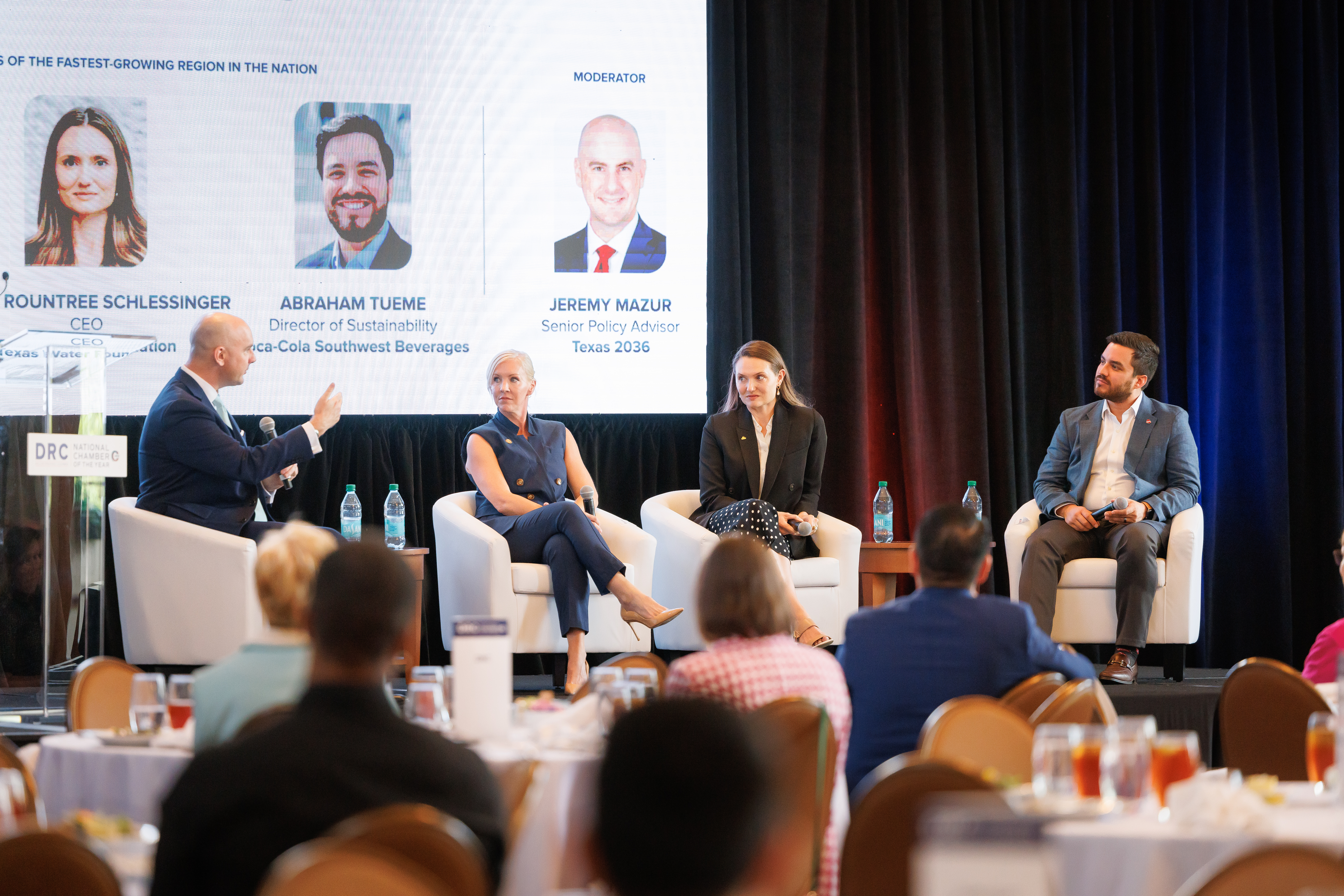By Catie George, Director, Communications & Storytelling
Dallas-Fort Worth is set to become the third-largest metropolitan area in the U.S. by 2028, meaning the region’s future economic competitiveness depends on its infrastructure, including reliable and affordable access to energy and water.
To help address this topic, the Dallas Regional Chamber (DRC) hosted its second annual State of Infrastructure, presented by Jacobs, Thursday, June 27, at the Eddie Bernice Johnson Union Station. The event featured ERCOT President & CEO Pablo Vegas plus a panel of experts and decision-makers on Texas’ water supply.
Here are five things to know from the DRC’s State of Infrastructure.

Growth is driving demand and will only continue in years to come.
As the fastest-growing metropolitan area in the country, Dallas-Fort Worth added an average of 418 people per day in 2023.
“We need to keep up with that growth,” said Dale Petroskey, president and CEO of the Dallas Regional Chamber. “We need infrastructure—roads, bridges, water, electricity, broadband—to keep growing and prospering. We can’t afford to fall behind.”
In his keynote, Vegas said that the state’s projected energy demand is expected to nearly double in the next five to six years.
Innovative technologies are crucial to meeting the increasing need.
ERCOT has been innovating to meet needs. For example, they launched the ERCOT Contingency Reserve Service.
“We defined a set of generating resources that have to be able to turn on in 10 minutes and be able to serve power immediately for two hours, just in case we have a high-risk situation,” shared Vegas. “We also buy firm fuel supply, and we incentivize power plant operators to have their fuel stored on their site extra if they need to, just in case pipeline capacity gets constrained during the winters.”
Texas’ power grid is flexible to meet its unique needs.
Texas is the only state with its own power grid, which means it is autonomous when it comes to setting energy guidelines.
“The 49 other states have to look to [a] federal agency in order to change their power market rules,” said Vegas. “Here in Texas, one of those benefits of being an electric island is we just have to look to the Texas State Legislature.”
Texas’ lone wolf status allows the state to be nimble and adapt specifically to Texas’ needs, according to Vegas.
“In addition to that, we have really changed the posture on how we operate the grid,” he said. “We’re more conservative in our operations; we bring more resources on earlier if we think there’s going to be scarcity to make sure that there’s always enough cushion and we don’t get surprised by a sudden change in forecast.”
Texas’ future water supply needs attention.
In November, the DRC’s Good for Texans campaign helped pass Proposition 6, which created the Texas Water Fund to finance water infrastructure projects throughout Texas.

“It’s great that our reservoirs are filled, but water is critical infrastructure and is always at the forefront,” said Brooke T. Paup, Chairwoman of the Texas Water Development Board. “There’s no Texas miracle without Texas water.”
Though there have been improvements around water, there is still an issue remaining: attention.
“Water is key to everybody; we need to have that top of mind, and we need to make sure those conversations are happening,” said Abraham Tueme, Director of Sustainability at Coca-Cola Southwest Beverages.
Water may not be a sexy conversation, but CEO of the Texas Water Foundation Sarah Rountree Schlessinger says corporations and the Texas Legislature must keep their eyes on this issue.
The future is digital, and our infrastructure needs to be able to support that.
Vegas shared that the future of the economy is digital, whether you are talking about artificial intelligence, cryptocurrency, or e-commerce. Texas needs to have the assets to support those economies.
“I would love Texas to always be in a position to lead the economic growth, irrespective of what that economic growth is. If it’s digital, that’s represented by data centers and AI, then yes, I want us to be able to have our doors wide open and say, ‘If you’re going to build and you’re going to invest, here’s the place to do it,’ because we have the people, we have the talent, we’ve got the infrastructure, we have the electric,” said Vegas. “That needs to be Texas’s answer to these opportunities because we do have the resources here. We are plentiful in natural gas, we are plentiful in renewables, so we should take advantage of that, and we should really exploit that opportunity.”
To learn more about the DRC’s work in Public Policy, visit our website.